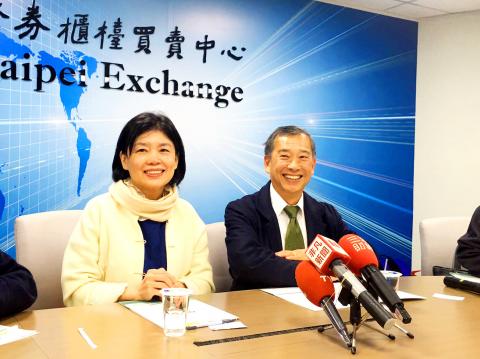OBI Pharma Inc (台灣浩鼎) yesterday released the results of its second and third-phase clinical trials of a new breast cancer drug, OBI-822, saying the outcome of the study shows “no statistical significance.”
While the study did not meet the primary efficacy endpoint of progression-free survival (PFS), the results still contain “meaningful scientific and clinical information,” which have provided “clear direction for future product development,” the company said in a statement.
OBI Pharma chairman Michael Chang (張念慈) said the company has received valuable information from the clinical trials, such as a substantial improvement in the PFS rate of the treatment group who demonstrated an immune response to the vaccine, as well as a clear, positive trend in the secondary endpoint of overall survival for patients.

Photo: CNA
“This information is very important for designing the global third-phase study of the new drug,” Chang said in the statement.
OBI-822 is designed to target Globo H, an oligosaccharide tumor antigen, to trigger the immune system to generate antibodies that activate cytotoxic T cells to destroy cancer cells.
Industry observers have viewed the drug as a promising aid to active immunotherapy for metastatic breast cancer, with curative effects far better than Herceptin of Swiss pharmaceuticals maker Roche Holding AG and Ibrance of US pharmaceuticals firm Pfizer Inc.
Chinese-language monthly Wealth Magazine executive director Hsieh Chin-ho (謝金河) yesterday raised some questions about OBI Pharma.
“The market was waiting for the results of OBI Pharma’s phase two and three trials for OBI-822 today, but the outcome is worse than expected, as it did not pass clinical trials,” Hsieh wrote in a post on his Facebook page. “How seriously will the news affect the company’s shares? I am afraid it cannot be taken in so easily,” he wrote.
OBI Pharma, the most expensive stock in the biotech sector, closed at NT$681 on the Taipei Exchange in Friday trading, down 3.81 percent from the previous session. The stock rose 3.97 percent this year and surged by 119.7 percent from its listing price of NT$310 in March last year.
The fate of the shares of another drug company in 2014 might be a lesson for OBI Pharma shares, Hsieh said, referring to Medigen Biotechnology Corp (基亞).
In July 2014, Medigen Biotechnology Corp announced an interim study of its new liver cancer drug, PI-88, saying it did not yield positive results, which drove its shares down for 20 straight sessions by the maximum daily limit until it fell to NT$112.5 from NT$459.
The sell-off in Medigen spread to other biotech stocks, causing great losses to investors at the time, Hsieh said.

Nvidia Corp chief executive officer Jensen Huang (黃仁勳) on Monday introduced the company’s latest supercomputer platform, featuring six new chips made by Taiwan Semiconductor Manufacturing Co (TSMC, 台積電), saying that it is now “in full production.” “If Vera Rubin is going to be in time for this year, it must be in production by now, and so, today I can tell you that Vera Rubin is in full production,” Huang said during his keynote speech at CES in Las Vegas. The rollout of six concurrent chips for Vera Rubin — the company’s next-generation artificial intelligence (AI) computing platform — marks a strategic

REVENUE PERFORMANCE: Cloud and network products, and electronic components saw strong increases, while smart consumer electronics and computing products fell Hon Hai Precision Industry Co (鴻海精密) yesterday posted 26.51 percent quarterly growth in revenue for last quarter to NT$2.6 trillion (US$82.44 billion), the strongest on record for the period and above expectations, but the company forecast a slight revenue dip this quarter due to seasonal factors. On an annual basis, revenue last quarter grew 22.07 percent, the company said. Analysts on average estimated about NT$2.4 trillion increase. Hon Hai, which assembles servers for Nvidia Corp and iPhones for Apple Inc, is expanding its capacity in the US, adding artificial intelligence (AI) server production in Wisconsin and Texas, where it operates established campuses. This

Garment maker Makalot Industrial Co (聚陽) yesterday reported lower-than-expected fourth-quarter revenue of NT$7.93 billion (US$251.44 million), down 9.48 percent from NT$8.76 billion a year earlier. On a quarterly basis, revenue fell 10.83 percent from NT$8.89 billion, company data showed. The figure was also lower than market expectations of NT$8.05 billion, according to data compiled by Yuanta Securities Investment and Consulting Co (元大投顧), which had projected NT$8.22 billion. Makalot’s revenue this quarter would likely increase by a mid-teens percentage as the industry is entering its high season, Yuanta said. Overall, Makalot’s revenue last year totaled NT$34.43 billion, down 3.08 percent from its record NT$35.52

PRECEDENTED TIMES: In news that surely does not shock, AI and tech exports drove a banner for exports last year as Taiwan’s economic growth experienced a flood tide Taiwan’s exports delivered a blockbuster finish to last year with last month’s shipments rising at the second-highest pace on record as demand for artificial intelligence (AI) hardware and advanced computing remained strong, the Ministry of Finance said yesterday. Exports surged 43.4 percent from a year earlier to US$62.48 billion last month, extending growth to 26 consecutive months. Imports climbed 14.9 percent to US$43.04 billion, the second-highest monthly level historically, resulting in a trade surplus of US$19.43 billion — more than double that of the year before. Department of Statistics Director-General Beatrice Tsai (蔡美娜) described the performance as “surprisingly outstanding,” forecasting export growth